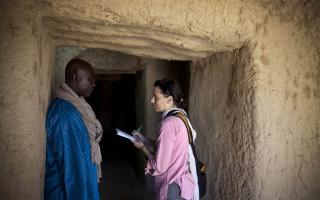UN System Executive Management Programme | 2024 Edition
A unique management learning experience tailor-made for UN managers across the system, both at headquarters and field locations.
The 2030 Agenda for Sustainable Development and the various United Nations(UN) reform processes currently underway call for UN managers to lead more effective teams; deliver increasingly meaningful results; become role models for UN leadership values and behaviours; contribute to transforming the organization by fostering a culture of innovation; implement change; and ultimately strengthen the UN’s ability to achieve the 2030 Agenda.
These issues have been highlighted by the experiences brought about by the COVID-19 pandemic, and the concurrent transition in management focus.
The UN System Executive Management Programme (EMP) is tailor-made to prepare UN staff in leadership and management positions to achieve these objectives. The programme has been designed to provide practical tools and knowledge to help managers address the complex realities they face, improving speed, responsiveness, and impact, both in challenging field locations and at headquarters.
This programme leverages UNSSC's academic network, instructional design expertise, and position within the UN system to create a highly-relevant, engaging, impactful and cost-effective programme. The curriculum combines real-life case studies from across the UN system with tested management tools and models, delivered by an interdisciplinary international faculty team and UN-experienced Coaches.
For more information, we would like to invite potential participants to take a look at our interactive e-Book on the programme here.
By the end of the programme, participants will be able to:
- integrate more principled, accountable, and inclusive approaches to managing themselves, and leading their teams;
- collaboratively design and implement scoped, relevant solutions to deliver results;
- more efficiently and effectively communicate with, and engage, internal and external stakeholders, to best leverage resources;
- plan and manage change and transition processes while role modelling a transformational mind-set, and creating an enabling environment for innovation;
- outline the importance of continuous learning and development to not only themselves but also their teams, and how this contributes to a more agile, effective organization.
At a modular level, and upon successful completion of the programme, participants should be able to:
- monitor and evaluate staff performance and address under-performance in a constructive manner;
- motivate and coach staff, supporting their career development;
- communicate more effectively, both within teams and units, and to external audiences;
- utilize tools and frameworks for analysing and making decisions in a structured manner;
- translate overall visions into realistic goals, by planning more strategically;
- better harness financial data and statistics for decision making and communication;
- communicate more effectively with staff, senior managers and peers;
- build and maintain long-term partnerships with key stakeholders;
- effectively manage change and guide teams and staff through transition;
- be a part of, and contribute to, a UN inter-agency peer network.
The UN System Executive Management Programme follows learner-centred design principles, and applies adult learning, case-based learning and social learning theories.
The programme consists of six Learning components:
- Online Learning;
- DiSC Personality Profile Assessment;
- 360-degree Assessment (designed around the UN System Leadership Framework)
- Executive Coaching sessions;
- An intensive Online Workshop; and
- The 'Tracking for the Future Tool' (Post-Programme Follow-up)
During the programme participants will have access to all course materials which are published on a dedicated UN Executive Lounge on UNSSC's learning platform, from their computer and/or mobile device. From this dedicated learning space participants will be able to engage in online discussions with peers and online moderators at any time.
The DiSC Personality Profile Assessment allows insight into motivations and stressors of themselves, and other DiSC workstyles. This may then be extrapolated out to a unit, team, or stakeholder level.
The 360-degree Assessment will help participants gain insights into their own management style, and the coaching sessions will assist in translating learning into action.
The Online Workshop focuses on the application of learning, while bringing together a diverse array of managers, allowing for cross-fertilization and engagement. Participants will work on authentic cases, collectively addressing challenges and seeking solutions. Resource persons and relevant experts will facilitate the problem-solving processes.
A new, seamless tool “Tracking for the Future” has been developed by the UNSSC and encourages reflection, behaviour change, and accountability. Delivered as a distinct follow-up to capacity building initiatives, the “Tracking for the Future” Tool seeks to respond to one of the key questions regarding training and capacity-building: what changed?
The programme consists of the following elements:
Online Phase: 26 August - 15 November 2024
Twelve weeks of online learning with an international faculty team, including peer sharing:
- Module 1: Change Management
- Module 2: People Management
- Module 3: Performance Management
- Module 4: Innovation
- Module 5: Partnership-building
- Module 6: Financial Resources Management
- Module 7: Executive Decision-making
- Module 8: Strategic Planning
- Module 9: Communication
Live webinars will take place at the following time, which makes them more accessible for colleagues based in Asia-Pacific Time Zones:
- 09:00 - 11:00 Turin; equating to
- 10:00 - 12:00 Beirut and Nairobi;
- 14:00 - 16:00 Bangkok; and
- 20:00 - 22:00 Apia.
360-degree Assessment: 28 August - 20 September 2024
Participants will undertake a 360-degree Assessment, incorporating feedback from direct reports, supervisors and peers. This assessment has been specifically designed utilizing the UN System Leadership Framework, to enable immediate impact.
Executive Coaching Sessions: 23 September - 29 November 2024
Two one-on-one sessions with an experienced executive coach, based on participants 360-degree Assessment report. All coaches either have a UN senior management background or have experience in coaching UN middle and/or senior managers.
DiSC Personality Profile Assessment: 15 November - 2 December 2024
Through this assessment participants will be able to identify their own strengths and weaknesses regarding the ways in which they interact with the people around them, while gaining insight into their motivations, stresses, and the way they respond to conflict.
Debriefing will be provided for participants to ascertain the best ways to identify the personality profiles of their staff, and how to tailor communication and engagement within teams for impact and results.
Online Workshop: 2 - 6 December 2024
An intensive week-long workshop, building on the learning delivered online. Participants will be working with other managers from across the system, applying learning through engaging case-studies, and contextualizing to their needs and realities.
Post-Programme Follow-up: The "Tracking for the Future" Tool (2025)
The process encompasses three key stages, and takes six-months to complete following the end of the programme:
- Stage One: Reflect and Review – Participants clarify the progress made through the original programme, revisiting their original 360-degree Assessment data, and assessing improvements and changes as well as prioritizing further areas to focus on with minor input from their manager – concluding with draft behavioural statements for tracking.
- Stage Two: Behavioural Tracker – Two-three future focused behaviours are evaluated by nominated two-three co-workers plus participants own open text contribution. This stage is repeated, so that change and transition may be tracked and verified;
- Stage Three: Review and Complete – Participants revisit their priorities, evaluate improvements and changes, and clarify what’s next in terms of development
The "Tracking for the Future" Tool has been specifically designed to be undertaken in conjunction with an additional 60-minute executive coaching Session, allowing for further contextualization, and ownership.
Programmatic Evaluations
At UNSSC, we highly value the feedback of our learners. At different stages of the programme, participants will have the opportunity to share their feedback. After the online workshop, participants will complete an evaluation form to help us improve subsequent editions of the programme.
Please feel free to look at the interactive eBook here.
We welcome UN officials in management and leadership functions at headquarters and in the field. Participants are expected to serve at P5+ or equivalent levels.
Exceptions can be made for participants serving at P4 or equivalent levels in case of comparable management responsibilities.
A similar programme is mandatory for Second Reporting Officers in the UN Secretariat.
The programme fee of $5,200 includes:
- tuition and materials for nine online learning Modules; a DiSC Personality Profile Assessment; a 360-degree Assessment (aligned with the UN System Leadership Framework); and two executive coaching sessions.
- the Intensive Online Workshop.
- the "Tracking for the Future" Tool and an additional 60-minute executive coaching session.
The UN System Staff College will award Certificates of Completion to all participants who meet completion requirements.




